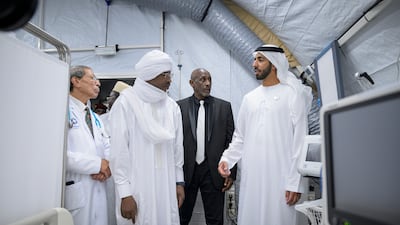The UAE has established a second field hospital in Chad to provide medical and healthcare services to Sudanese refugees.
The $20 million, 50-bed hospital in the eastern city of Abeche was inaugurated by Sheikh Shakhbout bin Nahyan, Minister of State, on Monday.
It has specialist departments for paediatrics, gynaecology and obstetrics, orthopaedics, general surgery and internal medicine.
It also has an operating room, emergency department, laboratory, pharmacy, a fully equipped radiology department and a 10-bed intensive care unit.
Sudan was plunged into chaos last April when clashes erupted in the capital, Khartoum, between rival forces – the country’s military, led by Gen Abdel Fattah Burhan, and the Rapid Support Forces paramilitary faction, commanded by Gen Mohamed Dagalo.
According to UNHCR, more than 553,000 refugees from Sudan had been counted in Chad by mid-February, meaning the nation was hosting the most displaced Sudanese people since the war started.
Operated by Burjeel Hospital - Abu Dhabi, the new field hospital has 22 doctors, 92 nurses, 12 medical support staff and 41 non-medical support staff.
Sheikh Shakhbout said the opening was part of the support provided to the Sudanese people affected by the conflict in their home country, since the war began in April 2023.
Over the past five years, the UAE has provided about $467 million worth of aid to Chad, of which $100 million went to support Sudanese refugees.
In July, another field hospital opened in Amdjarass offering medical services to those in need, especially children, the elderly and women.
Sudan tops the International Rescue Committee’s emergency watchlist, which looks at countries most likely to experience a deteriorating humanitarian crisis, because of the escalating conflict, mass displacement, economic crisis and a near collapse of healthcare services.
The conflict has left 25 million people – more than half of Sudan’s population – in need.


















